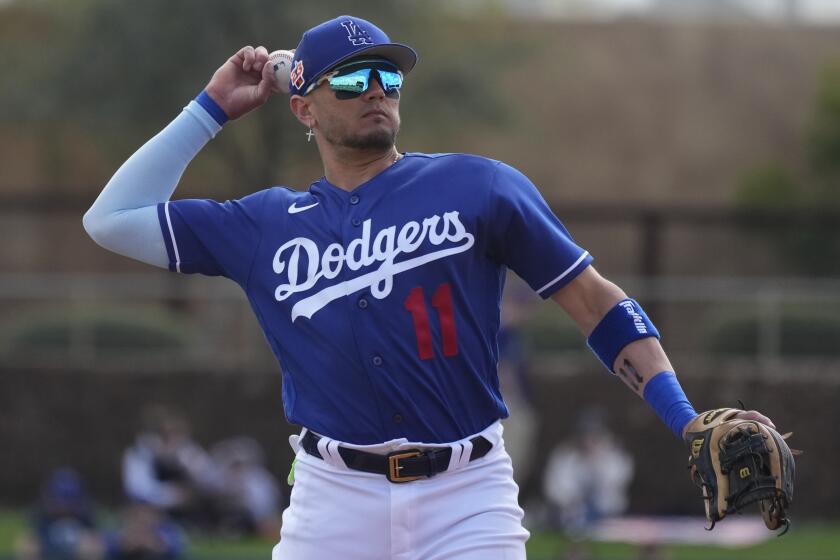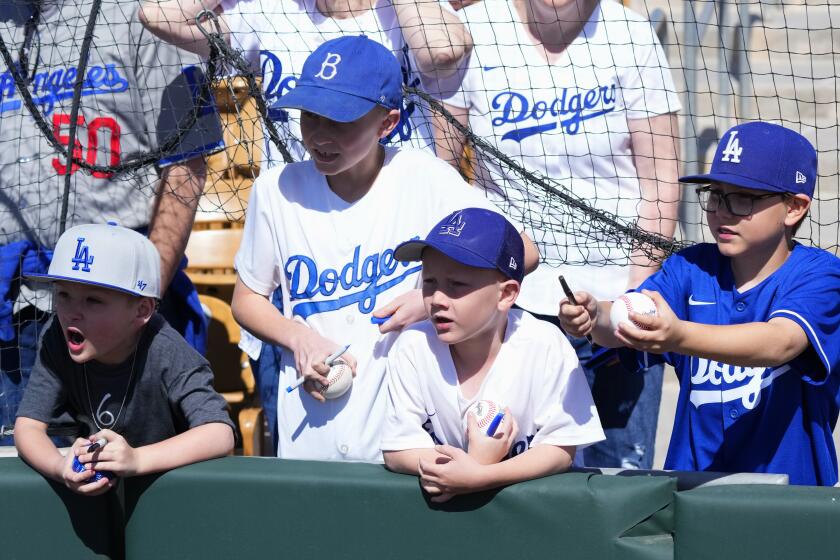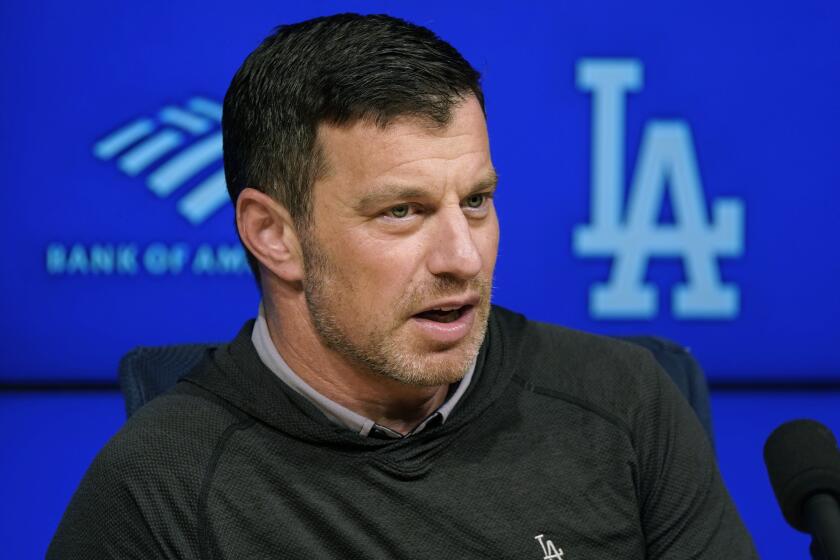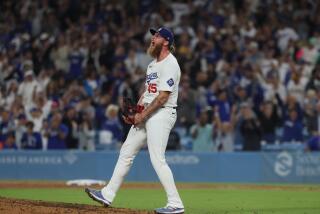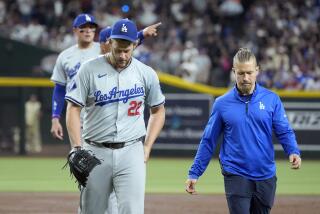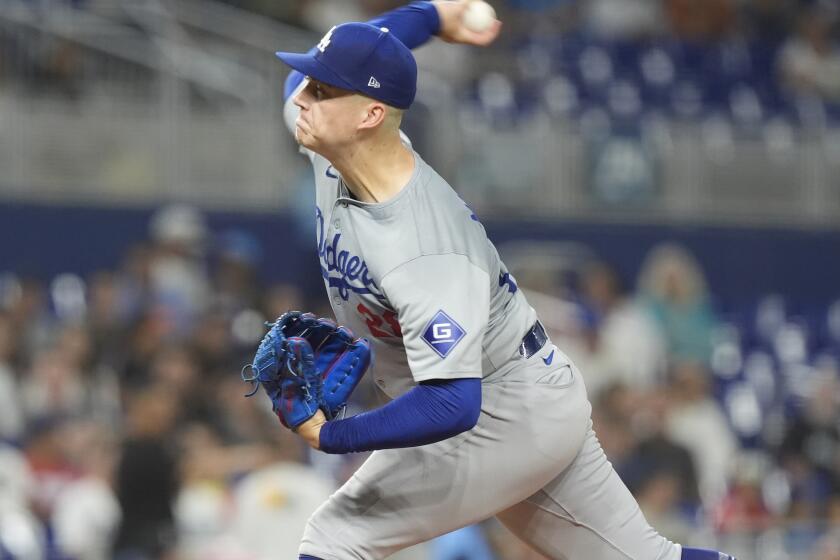Even without that swing, Dodgers’ Miguel Vargas finding ways to nurture his talent
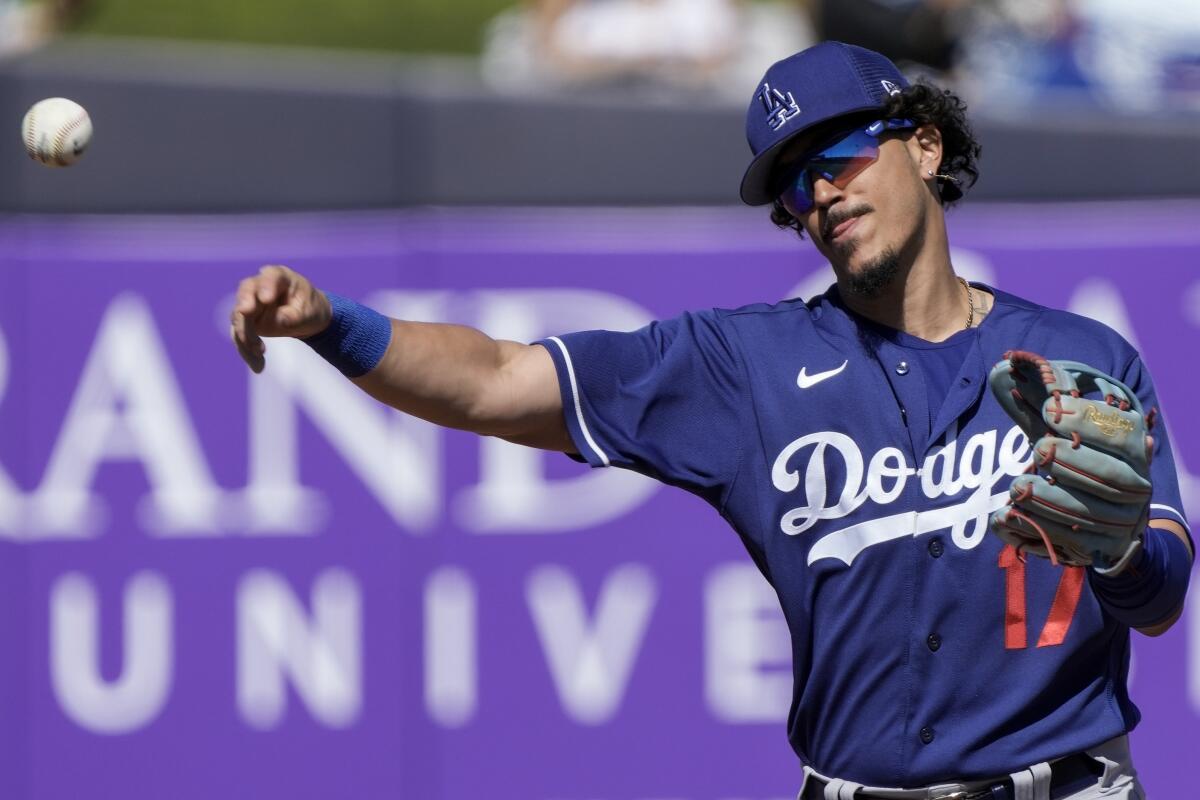
PHOENIX — In all his baseball life, Miguel Vargas had never done anything like this.
In every one of his Cactus League at-bats this spring, the Dodgers’ rookie second baseman has walked to the plate, taken his upright stance and swiveled his bat while waiting for a pitch.
At no point, however, has Vargas taken a swing. At least not in any games.
“It’s so weird,” the 23-year-old said with a self-deprecating laugh this past weekend. “I feel so uncomfortable at the plate.”
There’s a reason behind the apparent springtime madness. During the first week of camp, Vargas suffered a hairline fracture in his right pinkie while taking a grounder.
With Gavin Lux out for the year with a torn ACL and no other natural shortstops on the Dodgers’ major league roster, Miguel Rojas will get a lot more playing time.
It wasn’t a serious injury. No surgery or cast was required. His defense has been unaffected, which is why the soon-to-be starting big league infielder has continued playing in exhibitions.
But out of an abundance of caution, the Dodgers barred Vargas from swinging in any of those live at-bats.
“It’s part of what I have to do,” Vargas said. “And whenever I’ll be able, I’ll be ready to swing.”
The Dodgers are hoping that day will be soon. According to manager Dave Roberts, the team is targeting Wednesday’s game to clear Vargas for his first real swings of spring.
For a highly touted prospect known primarily for his bat, it’s been a strange experience.
The longer it’s gone on, though, the more the situation has yielded some unexpected silver linings.
“He understands the process,” Roberts said. “And I just think the value we’ve had to get him out there, get his legs under him and play some defense has been real beneficial.”
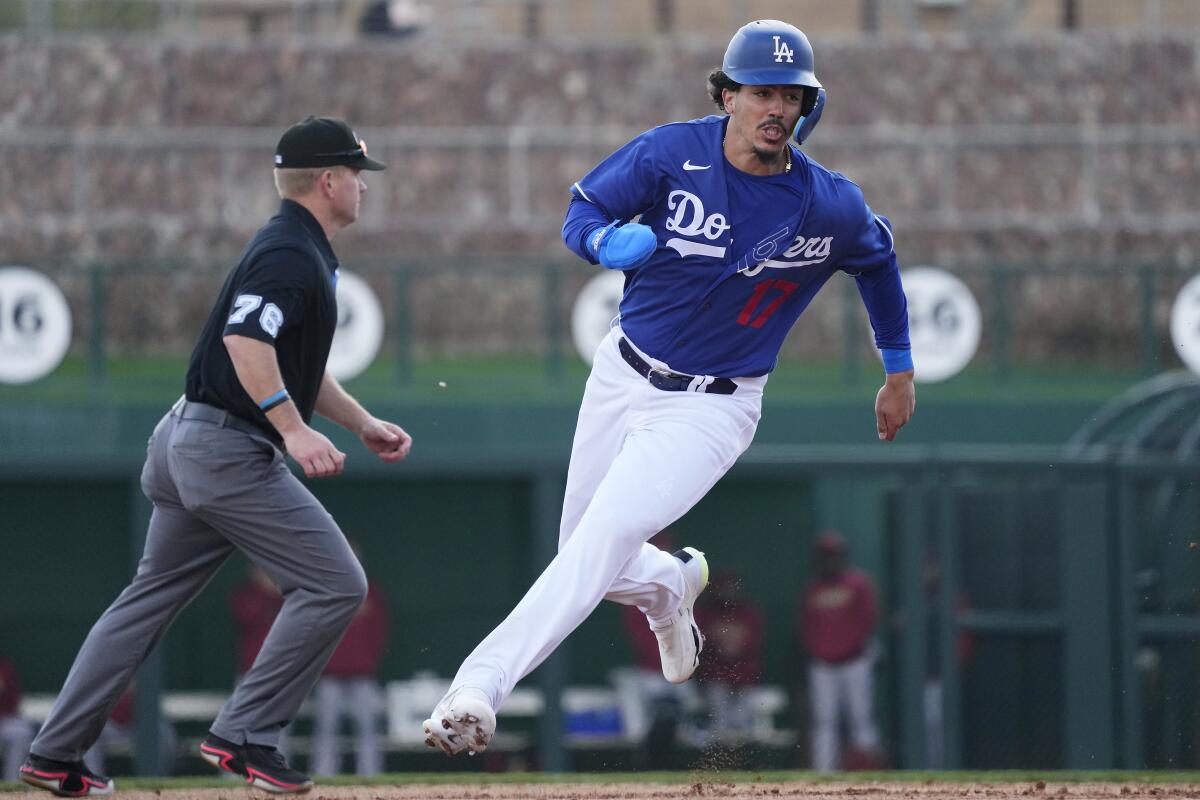
The most notable outcome: Vargas still has gotten on base regularly in the last couple of weeks.
He’s walked four times in 10 plate appearances, pitchers either unaware of his limitations or more focused on their own mechanics and delivery to care.
Kansas City’s Zack Greinke was an exception Saturday night, throwing Vargas a 59-mph curveball knowing that he wouldn’t offer at it.
Other than that, Vargas has made a comical habit of taking four balls and walking to first base.
“They probably don’t know,” joked Vargas, who walked only twice in 50 big league plate appearances during his debut last year.
“If they knew, they’d probably use three pitches.”
It also has come with an underlying benefit, allowing Vargas to track a slew of pitches as he prepares for his first full campaign.
An Ipsos poll of 1,035 American adults in January found that baseball was the second-most liked sport behind the NFL.
“He’s seen so many pitches at the plate,” Roberts said.
“I think that has a way of helping too.”
Vargas’ time in the batting cage has been reduced and constructively reallocated as well.
Since his throws are unimpeded by his injured pinkie, Vargas not only has been able to continue defensive drills, but also has increased his time fielding grounders around the infield.
It’s a potential key development for a player whose defense is a major question at second base, a position at which the Dodgers have little depth in the wake of Gavin Lux’s season-ending knee injury.
Finding a defensive fit for Vargas has been a challenge for the Dodgers throughout his minor league career. He primarily played third base in their farm system and last year experimented in left field as well.
However, Vargas feels most comfortable at second base.
But so far in camp, during games and backfield drills, he’s been susceptible to misplays, from booted grounders to errant throws.
“It’s part of the experience,” Roberts said. “But as long as the intent, the way he’s preparing [doesn’t change]... there’s going to be some growing pains. That goes without saying.”
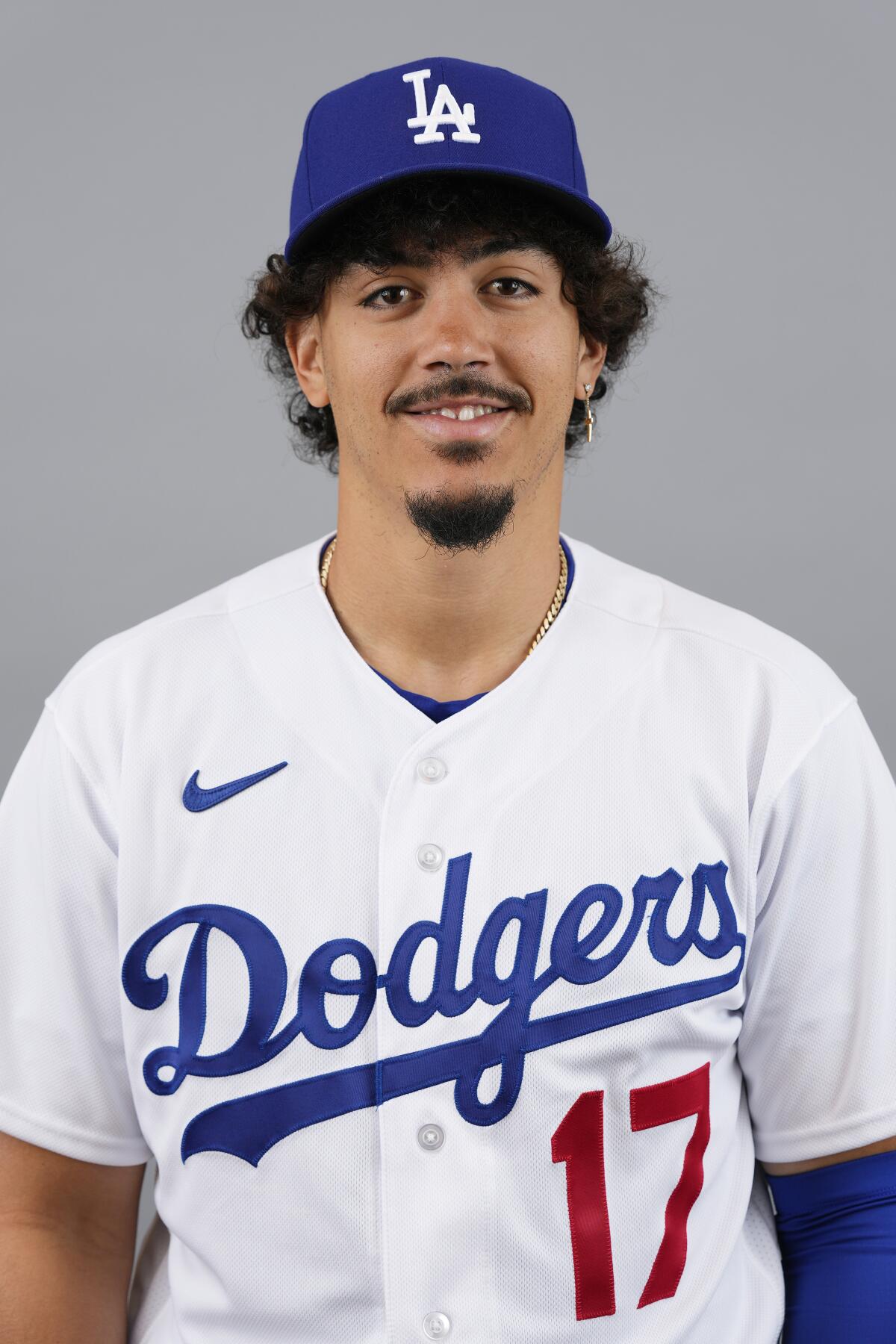
Roberts thinks Vargas has the athletic tools to succeed at second base and that he just needs to polish his fundamentals, from playing lower to the dirt to drilling a more consistent arm motion with his throws to first base.
“There’s been some really spectacular plays,” Roberts said, referencing a couple of diving efforts from Vargas in his early spring games.
“And then there’s been a couple plays that I think he could have made. So I think, at this point, that’s what we would have expected. But our expectation is, he’s expecting to improve each day.”
With his broken pinkie keeping his daily schedule free, Vargas often has been one of the last players to leave the backfields at Camelback Ranch.
Usually, that extra work has come under the guidance of infield coaches Dino Ebel and Chris Woodward, and alongside such veterans as Miguel Rojas and Mookie Betts.
“I have a lot of people involved in the process,” Vargas said. “They’ve helped me a lot.”
The fruits of that labor might be showing.
During one recent extended session with Betts, Vargas fielded almost every grounder cleanly, zipped accurate throws across the diamond from either side of second base, and looked more consistent with his body positioning and footwork.
When it ended, following a smooth double play Vargas started with an underhand flip to Betts at second, Roberts ran out to greet the rookie, shouting and clapping as though the Dodgers had just won a game.
“That was great!” the manager said.
Dodgers president of baseball operations Andrew Friedman is taking a longer view with the team in the wake of Gavin Lux’s season-ending injury this week.
Still, it won’t feel like a normal spring until Vargas can start taking hacks during games.
As much as he’s embraced the experiment — “At least I have excuses now when I strike out,” he said jokingly — he’s itching to get back to his routine at the plate.
“I’m just excited to swing,” he said.
When asked what he’s learned from his no-swing limitations, Vargas offered some humor again.
“I mean, it told me if I don’t swing at the ball, I’ll probably be at first 50% of the time,” he said with a laugh.
But when it was suggested his on-base-percentage might dip when he resumes swinging, the self-assured second baseman quickly countered — hinting at hopes his atypical spring ultimately will help round out his game.
“Maybe not,” he said. “It could go up.”
More to Read
Are you a true-blue fan?
Get our Dodgers Dugout newsletter for insights, news and much more.
You may occasionally receive promotional content from the Los Angeles Times.

